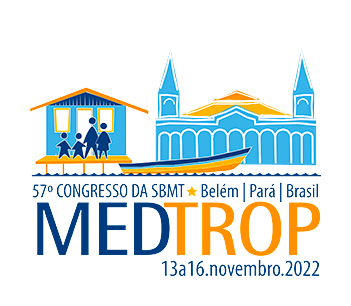Dados do Trabalho
Título
URBANORUM SPP.: FIRST REPORT OF INFECTION IN BRAZILIANS INDIGENOUS
Introdução
Intestinal protozoa and helminths are cosmopolitan enteroparasites that cause diseases of public health importance, but which are neglected because they affect poor and unassisted populations. The clinical manifestations and epidemiology of these pathogens are well known, however, little is known about Urbanorum spp., a protozoan parasite of the human intestine.
Objetivo(s)
Is reported the first cases of infection by Urbanorum spp. in indigenous population in Brazil.
Material e Métodos
Analyzes of fecal material were carried out and socio-environmental questionnaires were applied to those responsible for the schoolchildren of a Guarani ethnic group indigenous village in Paraná, Southern Brazil, to assess the prevalence of intestinal parasites in the population and associated risk factors, in order to propose more effective control measures. In addition to the optical microscopy analysis by the sedimentation in water and centrifugal-flotation methods, scanning electron microscopy (SEM) analyzes were performed.
Resultados e Conclusão
The total prevalence of intestinal parasites and commensals in indigenous schoolchildren was 84% (63/75) and the most prevalent species were Entamoeba coli 44% (33/75), Giardia duodenalis 34.7% (26/75) and Hymenolepis nana 32% (24/75). In addition to these, the presence of Urbanorum spp. was observed in 5.3% (4/75) of the students. The four children positive for this parasite, with or without polyparasitism, belonged to the same family organization, had frequent contact with the ground, played and fed together, had diarrheal stools and used albendazole 400 mg in a single dose as a control measure for parasites diseases in this population. In addition to the high prevalence of intestinal parasites, the finding of Urbanorum spp. in fecal samples from indigenous schoolchildren was reported for the first time in the country, and it is possible to observe forms of the parasite even after freezing the fecal sample at -20 ºC and after administration of the antiparasitic. The importance of this finding for the health of this population has been discussed, arousing interest in further research in relation to the morphological, biological and molecular aspects of this protozoan.
Palavras-chave
Urbanorum spp., Protozoa, Indigenous populations, Public health
Área
Eixo 06 | Protozooses
Categoria
(Concorra com apenas um trabalho) Concorrer ao Prêmio Jovem Pesquisador - Doutorado
Autores
Veridiana Lenartovicz Boeira, Marina Silva Carvalho, Danielle Lazarin Bidóia, Cristiane Maria Colli, Max Jean Ornelas Toledo
